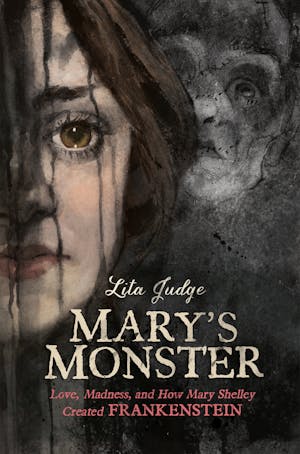DO NOT RETURN
JUNE 7, 1812
Early summer, in a time of war,
when the sea is a battleground
and ships are weapons,
I find myself on the deck of the Osnaburgh,
heading for Scotland.
Little separates me from the mail
and cargo in the ship’s hold.
I am like a letter stamped DO NOT RETURN,
being delivered to a future I cannot know.
I try to keep the shoreline in sight, as if this
will prevent the wind driving the sails.
But gradually, the land recedes into a thin line
and then is swallowed completely
by bruise-colored clouds.
I am left to feel
completely alone.
MEMORIES
The memory of my father’s face haunts me.
His mood was as dark as the sea when he put me on board.
My stepmother hadn’t even come to see me off,
nor had my brothers, who were away at school.
Only my sisters, Fanny and Claire, cried a little
as the ship pulled away.
At the thought of them I reach for the purse
that hangs at my waist.
It holds their letters and the coins Father gave me.
But my chilled fingers come away empty
and my despair sinks deeper.
The purse is gone.
It is an unpleasant reminder that I,
a fourteen-year-old girl traveling alone,
am easy prey for pickpockets and thieves.
I grip the rail tighter,
holding myself up on trembling legs.
How have things come this far?
THE FAMILY I LEAVE BEHIND
No one was kinder to me than Fanny.
She was only three years older than me,
but had been forced to be both mother and sister
since the day I was born,
because our mother had died.
From the earliest I can remember it was she alone
who wrapped soft, warm arms around me
and held me when I cried.
HERSCHEL’S COMET
Father used to tell me how he watched a comet with a tail of flame
hurl itself across the London sky
on the night that I was born.
That comet was like a messenger heralding a new era,
its path illuminating a line between old superstitions
and mankind’s growing understanding of the planets and stars.
But the almost impossible fact about that comet
was that it was discovered
by a woman.
Caroline Herschel was an astronomer,
self-trained
because women were barred from universities.
She toiled and labored
until she had named eight comets
and no one could deny she was a scientist.
Father gave me the belief that I could do anything
when he told me the story of the comet
that blazed across the London sky
on the night that I was born.
A CHILDHOOD OF POEMS
Father didn’t expect us to sew,
or play with dolls like other girls.
Instead he gave us the books our mother had written,
and encouraged us to read.
He taught us independence is admirable,
and imagination indispensable.
Fanny and I were allowed to stay up late
when Father’s friends came over to discuss science,
and politics, and literature.
My favorite friend was Mr. Coleridge,
who could make even Father laugh
with his game of making shadow creatures
dance on walls.
Then Mr. Coleridge would put down his hands
and his thoughts turned inward and dark,
and his liquid voice recited poetry
spooky enough to summon witches down our chimney.
But all of this ended when Father remarried.
Copyright © 2018 by Lita Judge





